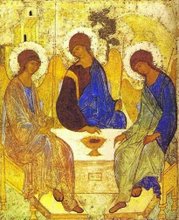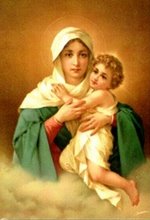257 "O blessed light, O Trinity and first Unity!" God is eternal blessedness, undying life, unfading light. God is love: Father, Son and Holy Spirit. God freely wills to communicate the glory of his blessed life. Such is the "plan of his loving kindness", conceived by the Father before the foundation of the world, in his beloved Son: "He destined us in love to be his sons" and "to be conformed to the image of his Son", through "the spirit of sonship". This plan is a "grace [which] was given to us in Christ Jesus before the ages began", stemming immediately from Trinitarian love. It unfolds in the work of creation, the whole history of salvation after the fall, and the missions of the Son and the Spirit, which are continued in the mission of the Church.
813 The Church is one because of her source: "the highest exemplar and source of this mystery is the unity, in the Trinity of Persons, of one God, the Father and the Son in the Holy Spirit." The Church is one because of her founder: for "the Word made flesh, the prince of peace, reconciled all men to God by the cross, . . . restoring the unity of all in one people and one body." The Church is one because of her "soul": "It is the Holy Spirit, dwelling in those who believe and pervading and ruling over the entire Church, who brings about that wonderful communion of the faithful and joins them together so intimately in Christ that he is the principle of the Church's unity." Unity is of the essence of the Church:
What an astonishing mystery! There is one Father of the universe, one Logos of the universe, and also one Holy Spirit, everywhere one and the same; there is also one virgin become mother, and I should like to call her "Church."
260 The ultimate end of the whole divine economy is the entry of God's creatures into the perfect unity of the Blessed Trinity. But even now we are called to be a dwelling for the Most Holy Trinity: "If a man loves me", says the Lord, "he will keep my word, and my Father will love him, and we will come to him, and make our home with him":
O my God, Trinity whom I adore, help me forget myself entirely so to establish myself in you, unmovable and peaceful as if my soul were already in eternity. May nothing be able to trouble my peace or make me leave you, O my unchanging God, but may each minute bring me more deeply into your mystery! Grant my soul peace. Make it your heaven, your beloved dwelling and the place of your rest. May I never abandon you there, but may I be there, whole and entire, completely vigilant in my faith, entirely adoring, and wholly given over to your creative action.
266 "Now this is the Catholic faith: We worship one God in the Trinity and the Trinity in unity, without either confusing the persons or dividing the substance; for the person of the Father is one, the Son's is another, the Holy Spirit's another; but the Godhead of the Father, Son and Holy Spirit is one, their glory equal, their majesty coeternal" (Athanasian Creed: DS 75; ND 16).
256 St. Gregory of Nazianzus, also called "the Theologian", entrusts this summary of Trinitarian faith to the catechumens of Constantinople:
Above all guard for me this great deposit of faith for which I live and fight, which I want to take with me as a companion, and which makes me bear all evils and despise all pleasures: I mean the profession of faith in the Father and the Son and the Holy Spirit. I entrust it to you today. By it I am soon going to plunge you into water and raise you up from it. I give it to you as the companion and patron of your whole life. I give you but one divinity and power, existing one in three, and containing the three in a distinct way. Divinity without disparity of substance or nature, without superior degree that raises up or inferior degree that casts down. . . the infinite co-naturality of three infinites. Each person considered in himself is entirely God. . . the three considered together. . . I have not even begun to think of unity when the Trinity bathes me in its splendor. I have not even begun to think of the Trinity when unity grasps me. . .
2845 There is no limit or measure to this essentially divine forgiveness, whether one speaks of "sins" as in Luke (11:4), "debts" as in Matthew (6:12). We are always debtors: "Owe no one anything, except to love one another." The communion of the Holy Trinity is the source and criterion of truth in every relation ship. It is lived out in prayer, above all in the Eucharist.
God does not accept the sacrifice of a sower of disunion, but commands that he depart from the altar so that he may first be reconciled with his brother. For God can be appeased only by prayers that make peace. To God, the better offering is peace, brotherly concord, and a people made one in the unity of the Father, Son, and Holy Spirit.
738 Thus the Church's mission is not an addition to that of Christ and the Holy Spirit, but is its sacrament: in her whole being and in all her members, the Church is sent to announce, bear witness, make present, and spread the mystery of the communion of the Holy Trinity (the topic of the next article):
All of us who have received one and the same Spirit, that is, the Holy Spirit, are in a sense blended together with one another and with God. For if Christ, together with the Father's and his own Spirit, comes to dwell in each of us, though we are many, still the Spirit is one and undivided. He binds together the spirits of each and every one of us, . . . and makes all appear as one in him. For just as the power of Christ's sacred flesh unites those in whom it dwells into one body, I think that in the same way the one and undivided Spirit of God, who dwells in all, leads all into spiritual unity.
Sunday, June 7, 2009
Subscribe to:
Comments (Atom)


